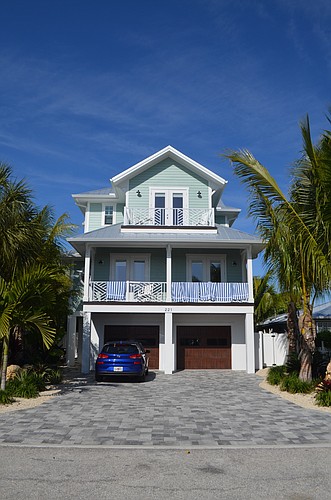- May 3, 2025
-
-
Loading

Loading

At Saturday’s meeting of the Coalition of City Neighborhood Associations, representatives from Sarasota’s barrier islands discussed a shared problem they’ve identified: large houses in residential areas being used as short-term vacation rentals.
Residents from St. Armands Key and Lido Key voiced concerns about properties they refer to as “hotel houses.” They point to homes in single-family neighborhoods built with seven or more bedrooms and say they’re being treated as “hotels without parking,” which cause problems for more permanent residents.
“These are commercial properties,” said Denis Bischoff, a Lido Shores resident. “They’re not residential properties, being built in residential areas, and the city is letting them do this. They’re destroying our neighborhoods.”
Their concerns have drawn the attention of some city officials. This week, Sarasota Mayor Jen Ahearn-Koch and other city leaders met with representatives of the St. Armands Residents Association to discuss the issue. Ahearn-Koch said it’s too early to know what action the city might be able to take to attempt to address the concerns residents have raised, but she said she intends to discuss the topic at the second City Commission meeting in January.
As the city prepares to discuss the severity of any issues — and potential solutions — she emphasized the specificity of the concerns she’s heard from residents. Resident complaints about short-term rentals aren’t a new phenomenon. The city has attempted to address past issues by making sure properties are complying with relevant city regulations, which require a minimum stay of eight days, and codes, which dictate standards for trash disposal and car storage.
Ahearn-Koch said Lido and St. Armands residents are focused on a particular type of structure they’re worried is becoming more common. Residents described the larger homes as “party houses” and state they’re being built and designed to accommodate large groups of people, not just families on vacation interested in staying near the beach. They have shared website postings that advertise properties as capable of sleeping more than 20 people.
The mayor stressed that the conversation she’s having is not focused on vacation rentals that are compliant with city regulations or coexisting peacefully within a neighborhood setting.
“It’s more of a commercial activity in a residential area, more of the group living that’s not families,” Ahearn-Koch said.
The city declined to make Planning Director Steve Cover available for an interview, but through a spokesperson, planning staff indicated its belief the issues would be difficult to address via building regulations. Although there are regulations in place barring the construction of multifamily homes in some barrier island neighborhoods, that does not restrict the number of bedrooms allowed in a structure built as a single-family home.
In an email to city officials, Tim Litchet, the city’s director of neighborhood and development services, said state laws restrict local governments’ ability to craft new regulations targeted at vacation rentals. He said that makes it challenging for the city to address issues associated with short-term rental properties.
In an email to city staff, St. Armands Residents Association President Kevin Bales pointed out that city regulations define tenancy in residential zones as either two or more relatives living together or a group of no more than four individuals living together. Ahearn-Koch asked staff about the potential to enforce or adjust those definitions. In response, Litchet said the city would need to be careful about maintaining compliance with federal fair-housing laws.
Beyond compliance with state and federal law, Ahearn-Koch said she was also sensitive about making sure any proposed solutions didn’t come with negative repercussions. She said the commercialization of neighborhood properties for short-term rental use can have a negative effect on the city’s housing stock, but she wanted to see more data and evidence to demonstrate there’s a legitimate problem in the city.
“I’m looking at a conversation that’s open to ideas and open to solutions and not a knee-jerk conversation where people just react,” Ahearn-Koch said.